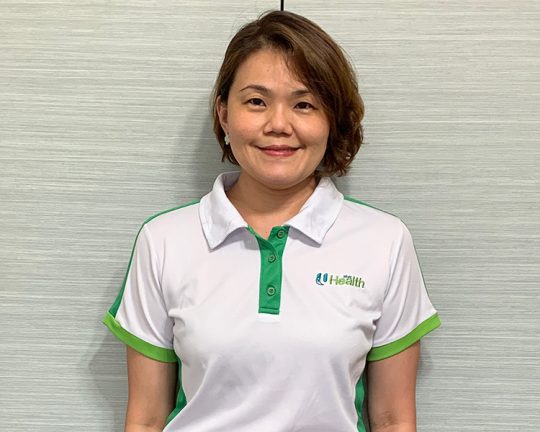
In Singapore, about 1 in 10 seniors above 60 are living with dementia. ¹
Did you know that our Day Centres for Seniors serve more than 400 clients who live with dementia? That’s about 1 in 3 clients. To care for these clients, we have staff specially trained in dementia management who help to guide the care team, and support caregivers. In this article, we speak with Senior Manager of Dementia Care, Ms Yik Pei Lin on what her job entails.
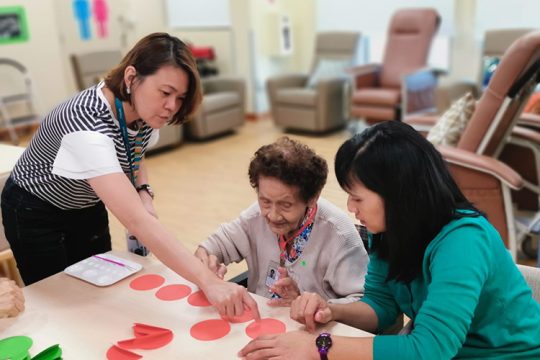
Pei Lin visits the Day Centres to observe the dementia programmes conducted by the care teams, and review clients with behaviours of concern. “These behaviours are usually triggered by unmet needs, such as having to visit the washroom, feeling hungry or thirsty, pain in their bodies, or boredom from lack of engagement.”
Pei Lin shared about a 69 year-old Senior Day Care client who had wandering behaviour. “His wife was very stressed and worried as he often went off on bus rides alone from where they stayed in Telok Blangah, to far-off destinations like Tuas or Changi Village without informing her and got lost.”
The client initially did not like being in the Day Centre, and was physically aggressive with staff. He also frequently tried to leave the centre by trying to force open the door of the main entrance. He was only able to communicate with single words like “no.. no” and “yes, yes”, and rejected other clients when they tried to speak with him.
After observing his behaviour, Pei Lin formed a care team comprising herself, a community nurse, the centre manager and the care staff. Together, they met with the client’s wife to understand more about his needs, including possible unmet needs which may trigger these behaviours. Due to their condition, people with dementia may not be able to express their physical and emotional needs, become disoriented in unfamiliar environments, or become bored due to lack of engagement.
The care team was guided to watch for non-verbal reactions such as frowning and restlessness from the client, and frequently reminded him of the time and place. They also engaged him with reminiscent-themed puzzles, which reminded him of his past hobby of assembling model planes. Gradually, the wandering and agitated behaviour stopped, and the client became more cooperative with the care team. Seeing these improvements, his wife was very grateful to the care team.
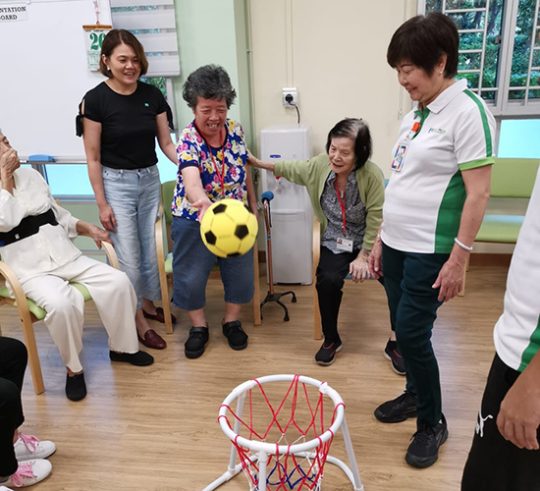
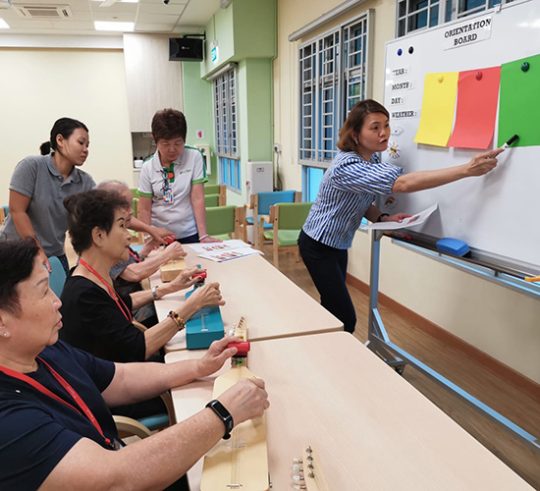
Pei Lin (in black top in first picture, rightmost in second picture) regularly plans different activities to keep the seniors active and excited! (pictures from before COVID-19)
Besides developing curriculums and conducting training for staff, Pei Lin provides support to caregivers, coaching them on how to live with loved ones with dementia. For instance, during the Circuit Breaker when most of our Day Centres were closed and many family members experienced caregiver burnout from looking after their loved ones with dementia, Pei Lin shared how her team stepped in to help. “We provided tele-consultations to guide families on how to manage their loved ones, and to defuse conflict arising from being in the same physical environment for extended periods of time as many of them were now working from home. We also developed digital activities such as cooking demos, singing sessions, bingo sessions so that our care team could engage clients online with mind stimulating activities.”
The many updates and guidelines for COVID-19 were also difficult for clients with dementia to remember, and Pei Lin and her team had to help them to cope with the situation. “Too much information can be overwhelming. We had to keep instructions simple and short. We had to be more patient with them, and constantly observe non-verbal cues to understand their feelings.”
Despite the hard work, Pei Lin is passionate about serving seniors.
It is so rewarding when someone who has been refusing to respond finally smiles or taps their fingers to a song, or when you receive a note of appreciation from a caregiver. I am always aiming to create a safe environment for the seniors, while helping them to live their life to the best of their ability!
Do not undermine their remaining abilities and preferences. Our role is to encourage their participation and provide adequate prompting without taking over the task. By allowing them to perform at their own pace, it will help promote a sense of self control and self-esteem. Even as dementia progresses, they may still be able to experience and respond to certain stimulations such as sound or touch.
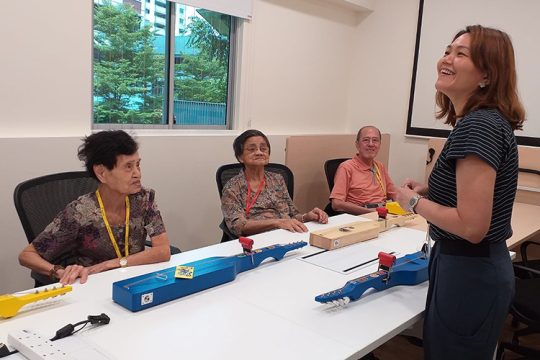
We should remember that people living with dementia are just like us. They are individuals with their own personalities and preferences, have basic needs like social interaction, feeling valued and respected, and feeling love and attachment to their loved ones.
¹ According to Well Being of Singapore Elderly (WISE) study in 2013.
Get in touch with us
Need affordable caregiving services? Find help with our Dementia Day Care services by visiting our Dementia Day Care page to learn more.


